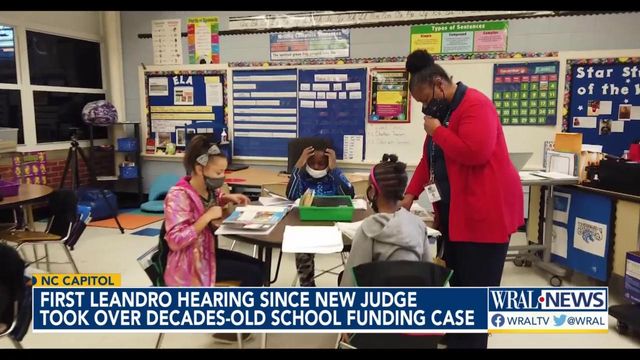New Leandro case judge calls for state analysis of budget impacts
It's the next step in a process expected to travel through multiple courts that could determine how quickly, if at all, the $5.6 billon court-approved 'Leandro Plan' can be implemented.
Posted — UpdatedThat's the timeline a new judge over the so-called "Leandro" education funding lawsuit has laid out.
And it’s a process that will feature arguments from state lawmakers for the first time in the history of the Leandro lawsuit. Already, during a conference call Thursday, attorneys for Republican General Assembly leaders indicated they would likely dispute the state’s analysis and argue for a total a reconsideration of the court-approved plan.
Attorney Matthew Tilley said the court should address whether the plan is even needed now to meet the state’s Constitutional obligations provide a “sound basic education,” in light of the new state budget.
“We believe that those are also items that are charged with addressing,” Tilley said.
Judge Michael Robinson, however, said Thursday he doesn’t intend to reconsider the plan. That would be a broad investigation, he said, that is not what he’d been directed do as a part of the 30-day review of the state’s budget’s impact.
“There is no way this court could engage in that kind of analysis in the time frame the Supreme Court has given,” Robinson said.
The plan — known is court as the “comprehensive remedial plan” and colloquially as the “Leandro Plan” — called for at least $5.6 billion is new, recurring education spending by the state by 2028, a more than 50% increase in state spending. It was drawn up in 2021 following research first undertaken beginning in 2018. It was agreed to by the plaintiffs in the lawsuit — low-wealth school boards, families and other groups — and the state defendants.
David Hinojosa, an attorney for the Penn plaintiff-intervenors, noted the three years of work that went into forming the plan, compared to the less than 30 days the superior court has left to review the state budget’s impact on the plan. He called the General Assembly’s request “very implausible and unnecessary and indeed outside the scope” of Robinson’s charge.
“It’s not just very unfair the children and students you represent as the targeted recipients of the programs and funds not being provided,” Hinojosa said, “but it’s a huge undertaking.”
What the court will hear
The plan itself is not in question in the current court battle. What is in question is a state superior court order to move state money around to fund part of the plan.
A Court of Appeals panel struck down the order, a decision that’s been appealed to the state Supreme Court. The Democratic-majority Supreme Court agreed to hear the appeal Monday once the superior court reviewed the order with respect to the impact the new state budget might have on it.
On the same day, state Supreme Court Chief Justice Paul Newby, a Republican, replaced the superior court judge overseeing the case — W. David Lee — with Michael Robinson, a business court judge and Republican.
Senate President Pro Tempore Phil Berger, R-Rockingham, and House Speaker Tim Moore, R-Cleveland, opposed both the order and the plan.
Other state entities, including the State Board of Education, have supported the plan. Attorney General Josh Stein has represented the state and submitted a brief in support of moving around funds in the manner that Lee eventually ordered. The plaintiffs had proposed moving around funds for the plan before Lee ordered it.
After state budget officials conduct an analysis of the state budget’s impact on the Lee’s order, Robinson has asked parties to submit briefings and responses. He'll hold a hearing April 13 where he'll weigh the impact of the new state budget on former Lee's order to allocate more than $1.7 billion of state money to education agencies.
Then, Robinson will decide whether to maintain Lee’s order as is or how it should be amended, before the state Supreme Court hears an appeal over whether Lee’s order should stand.
Basically, the Supreme Court will decide whether Lee’s order was constitutional, but only as Robinson allows the order to proceed to them.
Lee’s order intended to fund effectively the first three years of a planned known as the Leandro Plan. Five low wealth school boards, families and other groups have agreed with state defendants on the Leandro Plan, which calls for the $1.7 billion and in new, permanent education funding.
The new state budget doesn't include all of that, and Robinson is asking for a formal analysis of just how much remains incomplete.
During a court conference Thursday, Robinson also expressed skepticism that Lee's order was lawful because of its unusual means of appropriating funds. The state General Assembly is explicitly designated in the Constitution as the body that appropriates funds.
Lee was replaced as judge earlier this week by Republican state Supreme Court Chief Justice Paul Newby, in a move criticized by those who advocate for the Leandro Plan as political.
Education advocate Letha Muhammad has watched the case closely for years. She’s worried the goal is to undermine or overturn Lee’s order.
"Let's remove this Democratic judge and now put in a Republican judge by the Republican North Carolina Supreme Court [Chief] Justice. Yeah, that sounds like political shenanigans. That's what it looks like," said Muhammad.
• Credits
Copyright 2024 by Capitol Broadcasting Company. All rights reserved. This material may not be published, broadcast, rewritten or redistributed.






